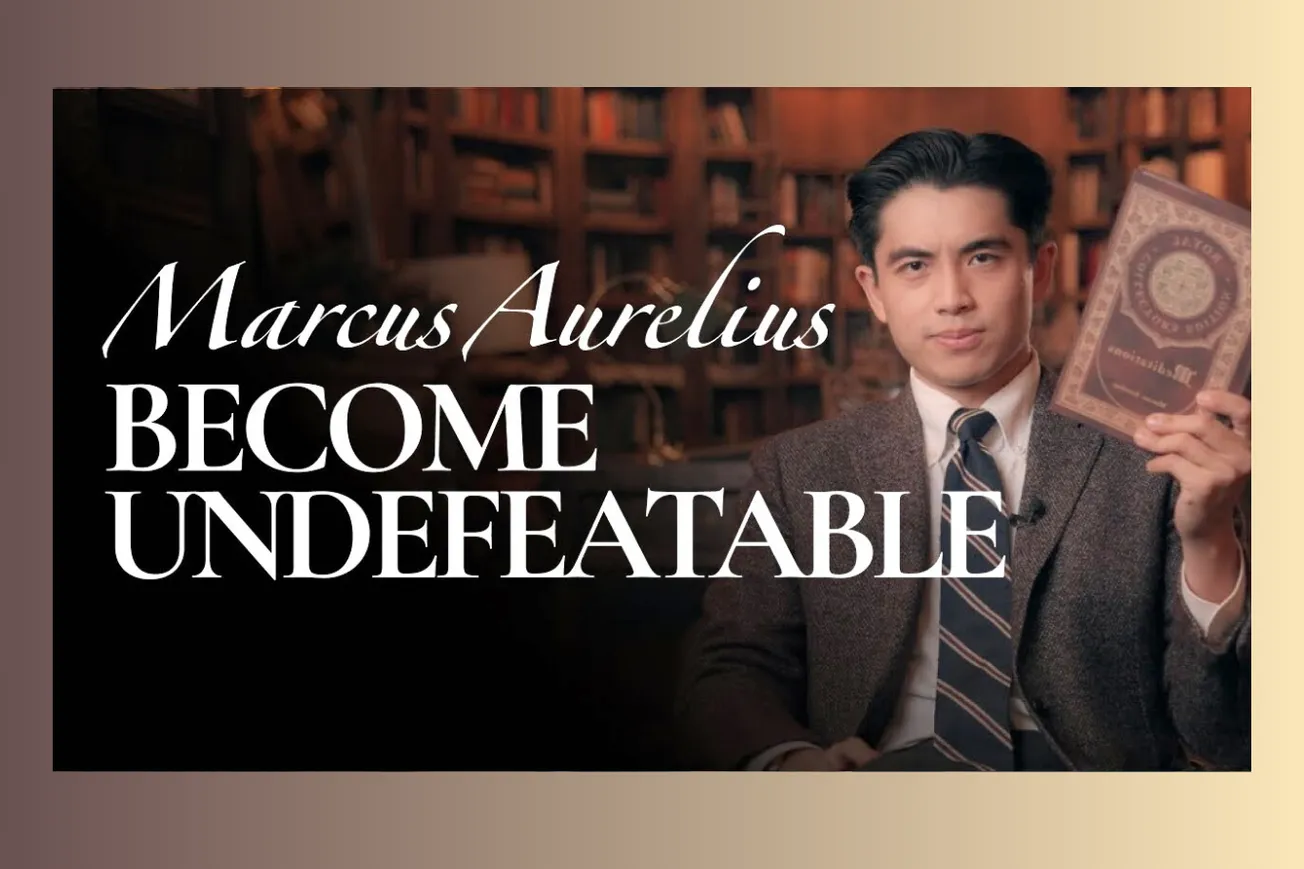Table of Contents
Jonathan's lecture, "Think Like a Philosopher King: Stoic Wisdom from Marcus Aurelius' Meditations," offers a concise yet profound exploration of Stoic principles. This overview highlights key takeaways: mastering control, pursuing virtue, and embracing fate. Discover how Marcus Aurelius' timeless wisdom can foster resilience, inner peace, and effective leadership in your own life.
Key Takeaways
- External goods like money, health, and reputation cannot determine your happiness—resilience comes from within, not circumstances
- Virtue alone creates lasting happiness; even torture and extreme misfortune cannot break a truly virtuous person's inner peace
- The "stripping method" reveals external goods' true nature by describing them without emotional narratives or social conditioning
- Preferred indifferent are valuable to pursue but shouldn't control your emotional state—strive for health and wealth without attachment
- Marcus Aurelius faced barbarian invasions, plagues, and personal tragedies while maintaining philosophical tranquility through daily practice
- Stoicism offers both transcendence above fortune's changes and deep engagement with worldly responsibilities and relationships
- The obstacle becomes the way when you treat life's setbacks as virtue-building challenges rather than happiness-destroying tragedies
- True Stoic resilience comes from genuinely not perceiving externals as evils, not from gritting teeth through suffering
- Happiness remains fully within your control through proper judgment, appropriate action, and virtuous response to any situation
Timeline Overview
00:00 - 07:55 - Introduction: Marcus Aurelius conquered external enemies and internal challenges with Zen-like peace; his Meditations offer transformative wisdom beyond surface-level quotes
07:55 - 13:47 - Against Externals: Money: Extreme wealth creates corruption risks; "happiness is possible even in a palace" but requires exceptional skill and virtue to navigate
13:47 - 17:27 - Against Externals: Health: Physical ailments cannot determine life quality; examples from Stephen Hawking to torture survivor James Stockdale prove happiness transcends bodily conditions
17:27 - 20:24 - Against Externals Philosophy: Even intellectual pursuits become externals when treated as mere academic exercises rather than practical life wisdom
20:24 - 23:27 - The Greek Philosophical Family: Plato, Aristotle, Cynics, and Stoics share common ground but diverge on crucial points about externals and happiness
23:27 - 27:11 - The Stripping Method: Therapeutic technique revealing external goods' true nature by removing emotional narratives and social conditioning from our perceptions
27:11 - 28:59 - Virtue-Only: Core Stoic claim that virtue alone determines happiness, breaking from Aristotelian requirement for external supporting conditions
28:59 - 31:32 - Aristotle vs. Stoics: Aristotle requires "adequate supply of external goods" for complete happiness; Stoics reject this entirely
31:32 - 35:20 - The Lucky and Unlucky Sages: Thought experiment comparing two perfectly virtuous people with radically different external circumstances
35:20 - 42:39 - Why Stoics Are Resilient: Resilience comes from not perceiving externals as evils, not from heroic endurance through suffering
42:39 - 49:49 - The Obstacle Is the Way: Misfortunes become virtue-practicing opportunities; "misfortune nobly born is good fortune"
49:49 - 50:55 - The Preferred Indifferent: Stoicism's solution to cynical detachment: some externals deserve pursuit without emotional attachment
50:55 - 57:55 - The Cynics: Diogenes exemplifies logical extreme of external indifference, living as a provocative social critic and public defecator
57:55 - 01:07:45 - Two Classes of Value: Preferred indifferent provide reasons to act without determining happiness outcomes
01:07:45 - 01:11:20 - Where to Find Meaning: Meaningful life requires striving toward greater goods beyond oneself, even when outcomes remain uncertain
01:11:20 - 01:13:04 - Transcendent and Immanent: Stoicism combines otherworldly happiness with this-worldly engagement and responsibility
01:13:04 - End - Conclusion: Practical applications and personal reflections on adopting Stoic principles for modern life challenges
Against Externals: Money
Most people assume wealth provides happiness insurance. Marcus Aurelius flips this assumption completely. "Happiness is possible even in a palace" suggests extreme wealth actually creates happiness obstacles rather than advantages.
- Marcus had unlimited access to luxury yet became Rome's most virtuous emperor through constant vigilance against corruption
- Wealthy families design elaborate trust structures and wealth-hiding mechanisms to protect children from money's corrupting influence
- The emperor himself wrote: "Take care you are not turned into a Caesar or stained with the purple—these things do happen"
- Even as a youth, Marcus actively resisted expected aristocratic behaviors like sexual indulgence and blood sports entertainment
This isn't anti-wealth moralizing. The Stoic position recognizes that both extreme poverty and extreme wealth create happiness challenges. The deciding factor isn't your bank balance but your skill in handling whatever circumstances you face.
Financial security provides certain advantages for virtue practice—you can be generous when you have resources to give. But attachment to wealth creates vulnerability to loss, while detachment enables clear-headed decision-making regardless of financial outcomes.
Against Externals: Health
Health seems obviously necessary for happiness. The Stoics disagree with stunning examples. Stephen Hawking lived most of his life paralyzed yet produced groundbreaking physics. Beethoven lost his hearing but composed his greatest symphonies afterward.
The most powerful example comes from James Stockdale, a Navy pilot who spent eight years as a Vietnamese prisoner of war. Four years in solitary confinement, repeated torture, and deliberate re-breaking of his injured leg didn't destroy his inner peace. When asked how he survived, Stockdale credited Stoicism.
- He bashed his own face to prevent use as propaganda
- He slit his wrists to protect fellow prisoners from his extracted information
- Upon release, he became a Stanford professor and vice-presidential candidate
- His verdict: "Your deliverance and your destruction are 100% up to you"
This doesn't minimize physical suffering's reality. Rather, it demonstrates that even extreme physical circumstances cannot necessarily determine life quality. The key variable remains your response to circumstances, not the circumstances themselves.
Against Externals: Philosophy
Even philosophy—supposedly the path to wisdom—becomes dangerous when treated as an external good. Marcus warns against falling in with sophists or getting lost in intellectual puzzles rather than practical life application.
"Give up your thirst for books so that you do not die grumbling" captures the risk of treating philosophy as intellectual entertainment rather than character transformation. Marcus valued philosophy as "the art of life" focused on living well, not knowing impressive theories.
His subjects worried their philosopher-emperor might eliminate popular entertainments and impose puritan restrictions. The external trappings of philosophy—robes, arguments, academic credentials—can corrupt the essential practice of examining and improving one's life.
The Stripping Method
Marcus developed a therapeutic technique for seeing external goods clearly by removing their emotional and social narratives. This "stripping method" describes things as they physically are rather than how culture presents them.
Examples from the Meditations:
- "Luxurious wine is grape juice"
- "Purple robe of the emperor is lamb's wool dipped in shellfish blood"
- "Sexual intercourse is the friction of an entrail, an expulsion of mucus accompanied by a kind of spasm"
The point isn't to make everything sound disgusting, but to separate reality from the stories we tell ourselves about external goods. Pride amplifies importance through false reasoning. When things seem most worthy of trust, we're most likely to be deceived by our own narratives.
Crucially, Marcus emphasizes using this technique when things go well, not just during hardships. You can't feel validated by success without feeling crushed by failure. The time to remember money doesn't determine happiness is when you're making money, not when you're losing it.
Virtue-Only: The Lucky and Unlucky Sages
To test Stoic claims about virtue determining happiness, consider two perfectly virtuous people with opposite external circumstances:
The Unlucky Sage suffers every conceivable misfortune—born deformed, orphaned, tortured, alone, repeatedly failed through no fault of his own. Yet he responds virtuously to every situation.
The Lucky Sage enjoys perfect health, loving family, successful career, and dies peacefully at 120. He also responds virtuously, never becoming arrogant or attached to his advantages.
Aristotle would say the Unlucky Sage deserves respect but cannot be called truly happy given his terrible circumstances. The Stoics bite the philosophical bullet: both sages are equally happy because happiness depends solely on virtue, not external conditions.
This seems insane until you consider the Stoic psychology. The Unlucky Sage doesn't experience his circumstances as evils to be endured—he treats them as indifferents, like losing a video game. His resilience comes from knowledge, not grit.
The parallel: Just as you know with absolute certainty that 1+1=2, the sage knows with equal certainty that external circumstances cannot damage his essential self. No amount of torture will convince either of you otherwise.
The Obstacle Is the Way
Marcus transforms the typical victim mentality around misfortune: "It is my bad luck that this has happened to me? On the contrary, say it is my good luck that although this has happened to me, I can bear it without getting upset."
This isn't positive thinking or silver lining searching. In the Stoic worldview, the Unlucky Sage actually is fortunate because he possesses the only thing needed for happiness: virtue. "Misfortune nobly born is Good Fortune."
- Obstacles become opportunities to practice different virtues than originally planned
- If war prevents political justice work, join the military to practice courage
- If an accident interrupts community service, forgive the other driver to practice compassion
- Each setback provides new material for character development
The sage approaches challenges like an expert Formula 1 driver approaches rain—not just enduring difficulty but feeling "giddy anticipation for the challenge." Obstacles don't just fail to break the sage; they actively contribute to his happiness through virtue exercise.
The Preferred Indifferent: Beyond Cynical Detachment
The logical conclusion of external indifference seems to be Diogenes the Cynic, who lived in a barrel, defecated in public, and masturbated in the marketplace. When Alexander the Great offered him anything he wanted, Diogenes replied: "Get out of my sun."
This creates a serious problem: if virtue can smooth over any external circumstances, why pursue external goods at all? Why not just become a philosophical bum?
The Stoic solution: preferred indifferents. Some external goods—health, wealth, security, justice—are worth pursuing without becoming attached to outcomes. They provide two kinds of value:
- Instrumental value: They make virtue practice easier and more impactful
- Intrinsic value: Pursuing them constitutes part of virtue itself
A doctor's happiness shouldn't depend on whether patients survive, but he must still do everything possible to save them. The patient's life is an indifferent regarding the doctor's happiness but a preferred indifferent worth striving toward.
This creates both transcendent and immanent philosophy—rising above fortune's changes while remaining deeply engaged with worldly responsibilities.
Practical Applications: The Gentle Kiss
Return to the controversial quote about kissing your child goodnight while contemplating death. Critics see cold detachment, but they miss the "gentle kiss" and "tender nightly ritual."
Understanding Stoic theory reveals the full picture:
- The child's life is an indifferent—the parent's happiness need not depend on the child's survival
- The child's life is also a preferred indifferent—the parent should do everything possible to ensure the child's wellbeing
- Contemplating death prevents taking the child's presence for granted
- "Dwell not on what you lack but what you have, and reflect how eagerly you would have sought them if you didn't have them"
The Stoic parent acts with equal urgency as any parent in protecting their child. The difference lies not in action but in emotional attachment to outcomes beyond their control.
The Personal Journal of an Emperor
What makes Marcus Aurelius uniquely relatable among philosophical figures is that Meditations represents private self-therapy, not public teaching. These are diary entries of a man fighting to become better, not lectures from someone who has already arrived.
- Someone untempted by posthumous fame doesn't remind himself nightly that it doesn't matter
- Someone not pained by his children's deaths doesn't develop complex grief rituals
- Someone not tempted by revenge doesn't write: "The best kind of revenge is not to become like them"
This book captures a man caught exhorting himself to be better. Marcus becomes not just a philosopher but a friend—someone struggling with the same human challenges while maintaining superhuman ideals.
Many books claim to be life-changing, but this is a rare one that actually is. The promise isn't that Stoicism is easy, but that it offers tools for maintaining inner peace while engaging fully with external responsibilities.
The monastery represents easy mode—it's simple to be indifferent to sex and money when you can't have them. Practicing Stoicism in the world, with wealth and family and political responsibility, requires master-level skill.
What's Next?
Ready to develop your own Stoic practice? Start with Marcus's techniques: use the stripping method when success tempts attachment, treat obstacles as virtue-building opportunities, and remember that your happiness depends entirely on how you respond to circumstances, not the circumstances themselves.
The philosopher-emperor's diary offers more than ancient wisdom—it provides a tested framework for maintaining peace and purpose amid modern chaos. His friendship across centuries reminds us that the same struggles and solutions span all human experience.





